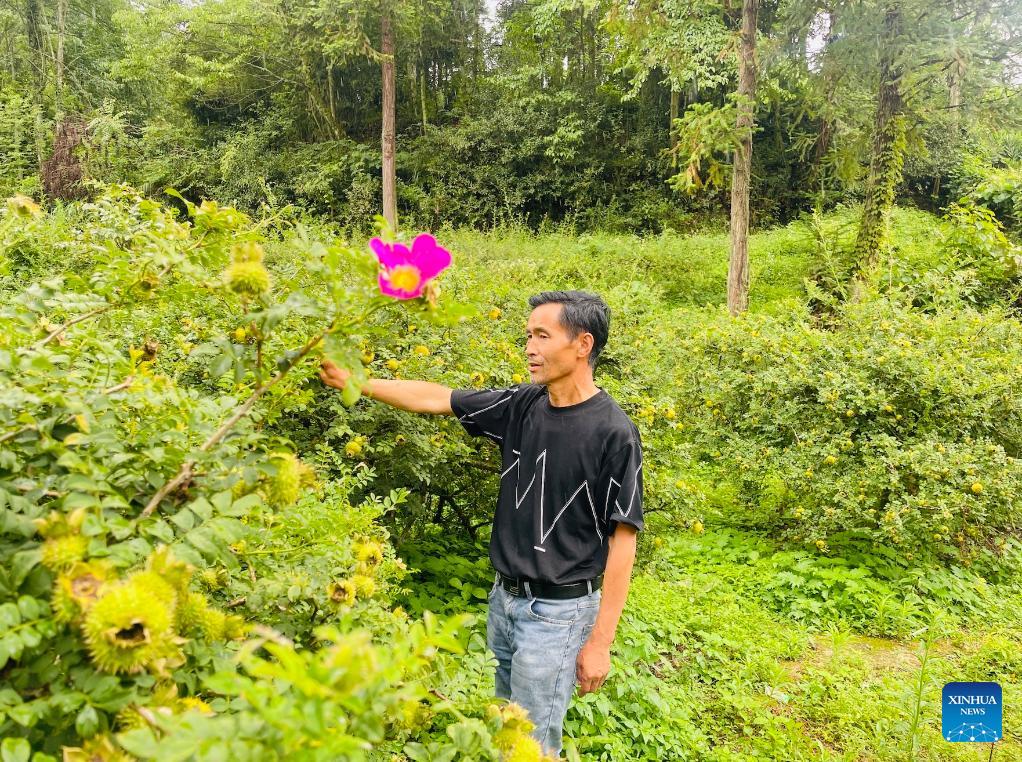
This photo taken with a mobile phone shows farmer Yan Qihua checking the growth of roxburgh rose fruits at a planting base in Chaxiang Village of Longli County, southwest China's Guizhou Province, Aug. 3, 2023.(Xinhua/Zhou Xuanni)
As autumn sets in, a stroll into Chaxiang Village in Gujiao Town, Longli County, located in southwest China's Guizhou Province, unveils a picturesque scene.
Alongside a meandering concrete road lie roxburgh rose fruit farms of various sizes. The bushes are adorned with numerous golden roxburgh rose fruits, filling the air with their delightful aroma.
Under the autumn sun, local villagers are busy gathering roxburgh rose fruits into baskets, while large trucks stand by to transport tonnes of these fruits to a nearby processing plant.
Shaped like an orange sea urchin with a delightful sweet-tart flavor, roxburgh rose fruit holds a special place in Guizhou's economy. Rich in vitamin C and various essential microelements, this fruit is used for making jam, tea and wine, and can even be candied. Moreover, its stems and roots find use in traditional Chinese medicine.
Longli County belongs to the Bouyei-Miao Autonomous Prefecture of Qiannan and is located in the middle of the Miaoling Mountains. Thanks to its warm climate and ample sunshine, Longli is very suitable for the cultivation of roxburgh rose fruits, earning it the title "County of roxburgh rose fruits in China."
Yan Qihua, a 60-year-old farmer from Chaxiang Village, deftly plucks ripe roxburgh rose fruits from his field. As he moves amongst the bushes, he carefully selects the fresh, mature roxburgh rose fruits adorned with their vibrant orange hue.
Yan started cultivating roxburgh rose fruits at the age of 38 and boasts over two decades of farming experience. He also lent his expertise to fellow villagers who followed his step. Yan's success story mirrors the significant growth of the roxburgh rose fruit industry in Longli.
"Villagers began to plant roxburgh rose fruits around 2000, but there was no market here. After picking the fruits, they would immediately ride to Guiyang on their motorbikes to peddle their fresh harvest along the street. Back then, the mountain roads were in poor condition, causing significant delays in transportation and making it difficult to sell all the fruits," Yan recalled.
He realized that the only solution to this problem was to establish efficient sales channels and develop a processing industry.
Between 2002 and 2003, Yan visited a nearby county's roxburgh rose fruit processing factory to acquire the skills needed for making fruit preserves. After numerous attempts, he successfully produced the first batch of handmade fruit preserves and generously shared his newfound expertise with fellow villagers.
"Since 2004, our village has started developing the fruit preserve processing industry, which opened up sales channels for local roxburgh rose fruit farmers. We also cooperate with enterprises in Guiyang to provide standard fresh fruits, slices, or preserved fruits according to their requirements," Yan said.
To inspire himself, Yan penned a Spring Festival couplet dedicated to roxburgh rose fruits and pasted it on his door. Though the red paper had slightly faded over time, the ink remained vibrant and bold.
It reads "As spring comes, Chaxiang Village is permeated with the aroma of roxburgh rose fruits; the well-off village is on its way to achieving moderate prosperity."
Pointing to this couplet, Yan said, "We are turning this dream into reality."
At the roxburgh rose fruit production and processing base of Chaxiang Village cooperative, Yan Qifu, responsible for checking the roxburgh rose fruit production equipment, quickly takes a seat and starts the day's online promotion session.
Seated in front of the camera, he skillfully introduces roxburgh rose fruits and the candied fruit to viewers, with fresh fruits neatly arranged on the desk.
Inspired by his older brother Yan Qihua, Yan Qifu returned to their hometown in 2008 to start a roxburgh rose fruit farm and processing workshop. He began to produce fruit preserves, tea, wine and various other specialty products derived from roxburgh rose fruits.
"Roxburgh rose fruit is rich in a variety of nutrients. The plant can also prevent desertification and soil erosion, and protect our ecological environment. Cultivating roxburgh rose fruits not only generates economic value but also benefits the environment, and this is why I decided to return to my hometown," Yan Qifu explained.
"After the formation of our village cooperative, I encouraged my fellow locals to join in. Our plantation base currently covers an area of 540 acres, yielding more than 450 tonnes of roxburgh rose fruits annually, with a total output value of 8 million yuan (about 1.1 million U.S. dollars). More than 300 villagers work in the base every year," Yan Qifu said.
Today, the roxburgh rose fruit industry stands as an important force driving the rural revitalization of Longli County.
The plantation area of roxburgh rose fruit in the county has expanded from nearly 6,000 mu (about 400 hectares) in 2000 to 105,000 mu today, yielding 16,000 tonnes of fresh fruits annually, with a comprehensive output value of more than 400 million yuan.
This industry has enabled over 8,000 farmers to boost their income, with roxburgh rose fruits fostering prosperity among the local people.